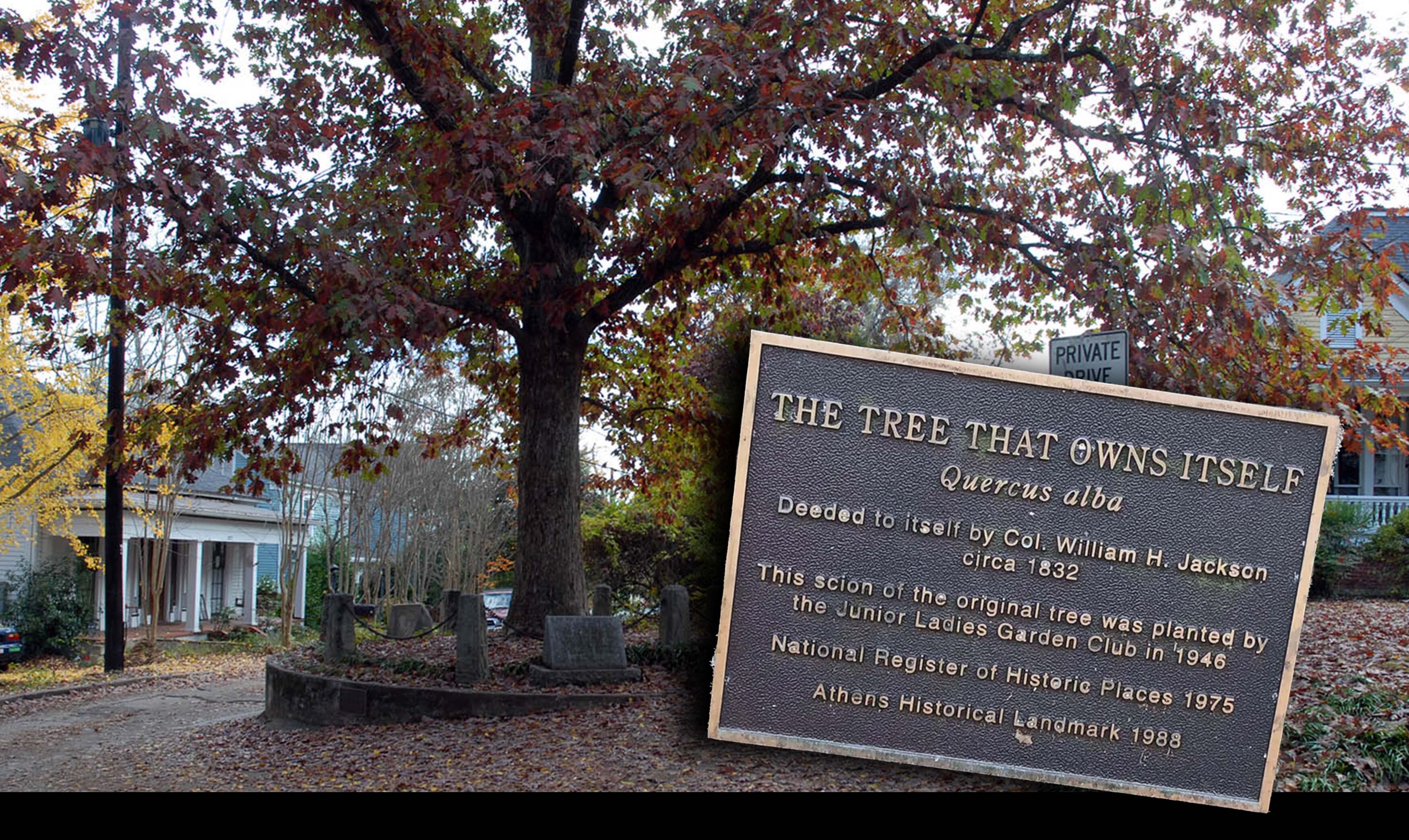Sovereign Sapling: The Tree that Owns Itself
Can a tree own itself? If you visit Athens, GA or Eufaula, AL, you’ll find trees that are self-owned. But is that even legal? It’s certainly one way residents of those cities have found to help protect their historic Oak trees. In this episode, we discuss plants rights, how those trees even came to have self-ownership, and then we ask trivia questions to a bunch of strangers on the Internet!

I just spent an entire day googling famous trees. Mostly, trees are notable for their physical characteristics. Like being the oldest tree, the largest tree, the thickest tree, or the tallest.
For instance, in Lebanon, the Sisters Olive Trees are claimed to be 5 to 6,000 years old. If that’s true, they’re the oldest living trees in the world. The tallest tree in the world happens to be in Redwood National Park in California. It’s a Redwood known as Hyperion and it’s 379 feet tall. That’s taller than the Statue of Liberty. The largest tree by area is in Sequoia National Park, also in California. That’s known as General Sherman. There’s a tree in Tule, a town in Oaxaca, Mexico that is has the largest circumference. It’s a Montezuma Cypress and is 138 feet around.
But I wasn’t necessarily interested in trees that are notable for those types of characteristics. There are lots of trees that are notable for their history: trees that have been used for landmarks, trees where historic events happened, or trees that tell a story.
Colonel William Henry Jackson was a professor at the University of Georgia. Now some reports say that William went off to war and came back around 1890, but I can’t find any record of him serving in the war. But whether he served or not, he was in Georgia, which means in his lifetime, he saw William Tecumseh Sherman burn and destroy cities in his state on his march to the sea. He was very aware of wanting to preserve his childhood memories. Jackson had grown up there where his father was Governor of Georgia and before that, was a Congressman, a Senator and a Revolutionary War Veteran. His grandfather had also been a Congressman and State Supreme Court Justice. The family ties were strong and his memories of growing up on the property there in Athens Georgia were very important to him.
In particular, he remembered playing on the large oak tree in the yard. It stood at the corner of South Finley and Dearing Streets. So whether he returned from war, or returned from studying or vacation, one thing that people agree on is that he decided that, for as long as he lived and in perpetuity after his death, he never wanted anything to happen to this tree. He supposedly wrote a deed that said the following:
“I, W. H. Jackson, of the county of Clarke, of the one part, and the oak tree … of the county of Clarke, of the other part: Witnesseth, That the said W. H. Jackson for and in consideration of the great affection which he bears said tree, and his great desire to see it protected has conveyed, and by these presents do convey unto the said oak tree entire possession of itself and of all land within eight feet [2.4 m] of it on all sides.”
Now – did that actually happen? It’s tough to say. The only surviving record of this deed came from a newspaper article from The Athens Weekly Banner in August of 1890.
Whether or not the deed actually existed – and at the time of that newspaper article, there were several people who claimed to have seen it – it has more or less been honored. That is – until the tree sadly fell down in 1942. But because one of its acorns was saved, the locals grew a brand new tree from that acorn, planted it in the same place, and gave the new sapling the same treatment: self ownership.
When you visit the tree today, known to locals as “The Jackson Tree,” “The tree that owns itself,” or “The Son of the Tree That Owns itself.” You’ll see a stone with an inscription that reads: “For and in consideration of the great love I bear this tree and the great desire I have for its protection for all time, I convey entire possession of itself and all land within eight feet of the tree on all sides. – William H. Jackson”
But is this type of thing even legal? Can it hold up in court? If you bought the property on the corner of Dearing and Finley, and – let’s say you were an agent of chaos, or hated trees – could you chop the tree down, legally?
Before we talk about the legality of a tree owning itself, I have to say something. For the last three weeks, the same thing has happened with this podcast. I start out with a story idea, begin the hours of research and then completely get sidetracked when I find multiple instances of the same story. It happened with the train crashes, it happened with the children raised by animals and it happened this week with the tree. So we’re going to travel from Athens, Georgia to Eufaula, Alabama.
And this story is so similar to the Jackson Oak that there’s no way they both came up with this independently. Someone in Eufaula, Alabama HAD to have heard about the Jackson Oak in Georgia. Because almost 50 years later – we’re talking 1935 – there was a tree deemed to have self ownership there on the corner of Cotton and Highland Avenues. Lots of the story is the same. Apparently it was the property of Confederate Soldier, Captain John A. Walker. The proclamation of self-ownership covers the tree and an 8 foot circumference around it, and it’s an Oak Tree. So much of the same story. In this case, it happened later, so there’s good record of it. And the Mayor of Eufaula in 1935, E.H. Graves, apparently named the tree as owning itself in a special deed. The deed said: “I, E. H. Graves, as Mayor of the City of Eufaula, do hereby grant, bargain, sell and convey unto the ‘Post Oak Tree,” not as an individual, partnership nor corporation, but as a creation and gift of the Almighty, standing in our midst—to itself—to have and to hold itself, its branches, limbs, trunk and roots so long as it shall live.
— E. H. Graves”
So there it is. This tree is known as the Post Oak Tree, The Walker Tree and “The Tree that owns itself.” This tree – like the Jackson Tree in Athens, Georgia – isn’t the original. In this case, the tree has been replaced several times. And at one time was even replaced by International Paper, who put their name on a plaque with the phrase “Only God can make a tree.”
So is any of this legally binding? Well in practice, both of these trees are considered self-custodial. Kind of. Technically, the Athens tree isn’t even on the original Jackson property. And the city takes care of it. I mean, a tree can’t trim and water itself. If the tree gets blight, it can’t apply its own treatment. To answer the question here – no. This isn’t legally binding. In order to be given custody – whether it be of a person or property – you have to be able to communicate receipt. Which a tree can’t do.
There have been discussions on the rights of plants. In 2010 in the Netherlands, there was a political party – The Party for the Plants – that was formed to fight for plants rights. They didn’t win any seats on the country’s parliament. But hey – it worked for an animal rights party who did win two seats a few years earlier. But in New Zealand, there was a little bit of success in this area. In 2014, the Te Urewera Act made it so that the Te Urewera Forest was granted legal personhood. This was a place that was sacred to the Maori people and it’s basically similar to what America has done with its National Parks – it’s a protective act.
So in a novel, fun sense. Yes. These cities will tell you that the trees own themselves. But if you took the idea to court and wanted to tear them down, you’ll probably be able to prove that the trees themselves have no legal claim over their status. Even so, I love the idea. They’ve been tearing down a ton of old trees near my home to build new developments, and apparently being in my 40s means that I care about these things. I literally teared up the other day when I drove by a tree where I always used to see a family of Red-Tailed Hawks and it had been torn down. So maybe those trees needed to be self-owned.
If you’re even in Athens, GA or Eufaula, AL – or if you just have a tree in your life that you love – you now have some pretty great trivia to talk to people about.

Bonus episodes and content available at http://Patreon.com/MichaelKent
Review this podcast at https://podcasts.apple.com/us/podcast/the-internet-says-it-s-true/id1530853589
For special discounts and links to our sponsors, visit http://theinternetsaysitstrue.com/deals

